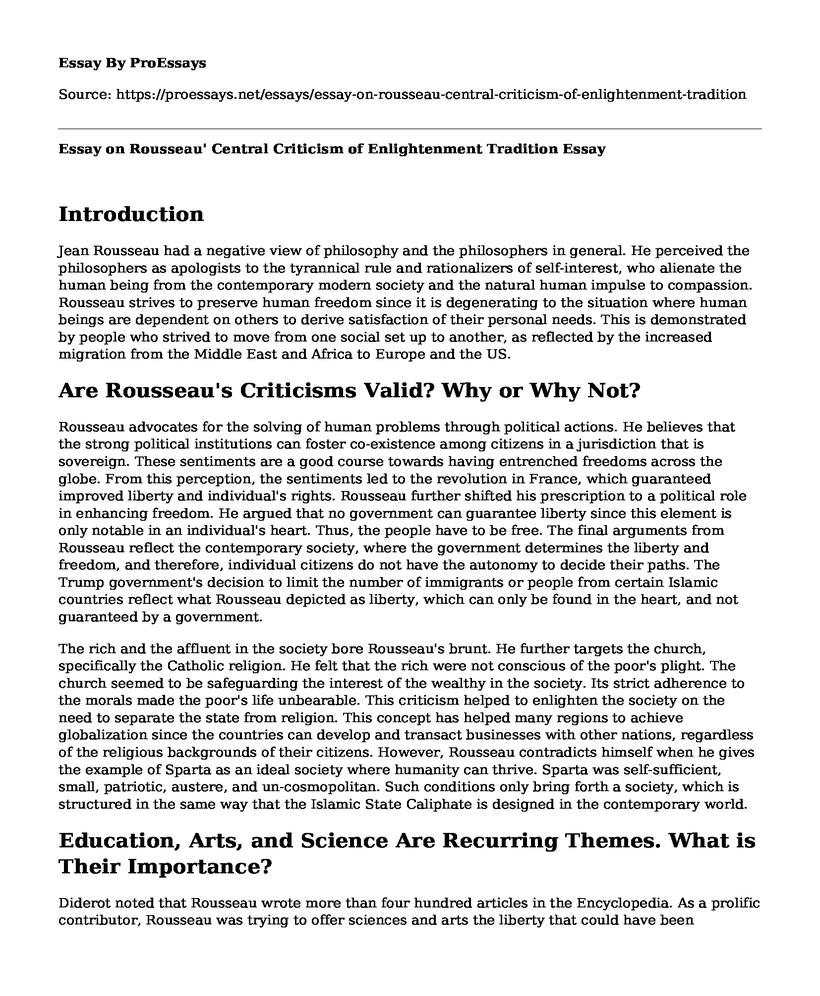Introduction
Jean Rousseau had a negative view of philosophy and the philosophers in general. He perceived the philosophers as apologists to the tyrannical rule and rationalizers of self-interest, who alienate the human being from the contemporary modern society and the natural human impulse to compassion. Rousseau strives to preserve human freedom since it is degenerating to the situation where human beings are dependent on others to derive satisfaction of their personal needs. This is demonstrated by people who strived to move from one social set up to another, as reflected by the increased migration from the Middle East and Africa to Europe and the US.
Are Rousseau's Criticisms Valid? Why or Why Not?
Rousseau advocates for the solving of human problems through political actions. He believes that the strong political institutions can foster co-existence among citizens in a jurisdiction that is sovereign. These sentiments are a good course towards having entrenched freedoms across the globe. From this perception, the sentiments led to the revolution in France, which guaranteed improved liberty and individual's rights. Rousseau further shifted his prescription to a political role in enhancing freedom. He argued that no government can guarantee liberty since this element is only notable in an individual's heart. Thus, the people have to be free. The final arguments from Rousseau reflect the contemporary society, where the government determines the liberty and freedom, and therefore, individual citizens do not have the autonomy to decide their paths. The Trump government's decision to limit the number of immigrants or people from certain Islamic countries reflect what Rousseau depicted as liberty, which can only be found in the heart, and not guaranteed by a government.
The rich and the affluent in the society bore Rousseau's brunt. He further targets the church, specifically the Catholic religion. He felt that the rich were not conscious of the poor's plight. The church seemed to be safeguarding the interest of the wealthy in the society. Its strict adherence to the morals made the poor's life unbearable. This criticism helped to enlighten the society on the need to separate the state from religion. This concept has helped many regions to achieve globalization since the countries can develop and transact businesses with other nations, regardless of the religious backgrounds of their citizens. However, Rousseau contradicts himself when he gives the example of Sparta as an ideal society where humanity can thrive. Sparta was self-sufficient, small, patriotic, austere, and un-cosmopolitan. Such conditions only bring forth a society, which is structured in the same way that the Islamic State Caliphate is designed in the contemporary world.
Education, Arts, and Science Are Recurring Themes. What is Their Importance?
Diderot noted that Rousseau wrote more than four hundred articles in the Encyclopedia. As a prolific contributor, Rousseau was trying to offer sciences and arts the liberty that could have been precious. The themes of art and science are the main pillars of Rousseau's essay that won the writing competition and propelled him to the limelight. Has the progress of the sciences and arts done more to corrupt morals or improve them? Rousseau argued that people's minds are corrupt; thus, sciences and arts act as flower garlands over men's chains that weigh them down. The increase in human knowledge has enhanced the corruption of the minds.
Cite this page
Essay on Rousseau' Central Criticism of Enlightenment Tradition. (2022, Jun 05). Retrieved from https://proessays.net/essays/essay-on-rousseau-central-criticism-of-enlightenment-tradition
If you are the original author of this essay and no longer wish to have it published on the ProEssays website, please click below to request its removal:
- Multiculturalism in Europe Essay Example
- Government: Running for Office in Texas Paper Example
- Essay Example on Ratification of US Constitution Leads to Formation of Antifederalists and Federalists
- Essay on Policing in the Post-Millennial Era: Enhanced Processes Through Emerging Technology
- Achieving the American Dream: A Look at the Possibilities - Essay Sample
- Feminist Concepts: Patricia Hill Collins & Standpoint Epistemology - Essay Sample
- Muslims in Western Democracies: Pluralism Tested - Essay Sample







